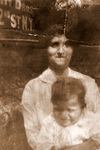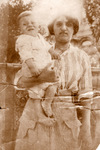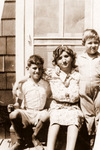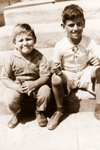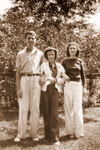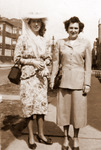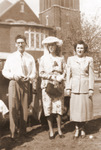 |
|||
|
|||
Manes Tuller and Bella Levine |
|||
Brooklyn, Kings County, New York Chicago, Cook County, Illinois |
|||
Manes Tuller and Bella Levine were married about 1910. Their oldest child, Ethel Joyce Tuller Sperling, was born on September 9, 1912. Their oldest son, Milton Leo Tuller was born August 25, 1914. Their address in 1916 was 702 Willoughby Avenue, Brooklyn, New York. Frances Tuller Levine was born on February 18, 1917. They had a sundry store in New York. Both Manes and Bella worked in the store and Milton and Ethel delivered milk at five in the morning when they were children. The store was in the middle of the block that also had a church and a school. Customers used oil cloth shopping bags. The family lived over the store and customers would come and holler up for milk which was 2 cents. The family spoke Yiddish at home. Ethel did not speak English until she attended school. Both Manes and Bella went to night school to learn English. For a time they lived two blocks from the beach and the kids would go barefoot the entire summer. The children also helped in the Sundry store. The family appeared in the 1920 census of New York. They were in Brooklyn on De Kalb Avenue. At that time they were living with Bella’s mother and sister. According to the census records, the household consisted of Morris age 33, "Bechie" age 27, Ethel age 7, Milton L. age 5, Frances age 2.4, Rive Levine age 58 and Bessie Levine age 26. They spoke Yiddish. At that time, Manes was working as a street car conductor. Morton Kenneth Tuller was born May 19, 1921 in Brooklyn at Beth Isreal Hospital. In 1926, they lived in Hartford, Connecticut for a year. They were back in Chicago when the youngest child, Robert Lester Tuller, was born on August 16, 1927. They were not very religious, but Friday night candle lighting was observed. They only went to temple on the high holidays. Manes went to a small Shul. Milton made his Bar Mitzvah. At the time of the 1930 census they were living in Chicago, Cook County, Illinois. According to the census records, the household consisted of Manna age 41, Bella age 39, Ethel age 17, Milton age 15, and Francis age 13. Bobby and Mort were not listed. Manes was working as a decorator. Manes would honk when he came home and the kids would bring in the heavy painter's equipment like ladders and brushes. The family always had poodles or pekingese. All the poodles were called Whitey. Mort didn't want to eat unless there was a dog at the table.The family was very poor. Mort slept on the dining room chairs and they always got a flat on the third floor because it was cheaper. They would unscrew the bulb in the hall and put in a double socket and add a hot plate. There was no other electricity in the apartment. The kids would do their homework in the hall. They didn't change their clothes for a week and the clothes always had holes. They would glue two corn flake lids together and cut them and put one set in their shoes and one in their pocket in case it rained. They received coats and food from welfare. Morton remembered one blue coat with sheepskin lining. On Wednesdays a truck with two boxes of food would arrive. The family would also put bobby pins on cards to make a little extra money. When they lived in Chicago a horse wagon would go up the street and the man would call out "old rags and iron." They made balls of foil wrappers and collected rags and the man would buy them. The kids would chew tar from the street and roast potatos in a bonfire for a treat. Going to the movies was another treat. The movie cost 5 cents, a hot dog was 5 cents, a 12 ounce soft drink was 2 cents and candy was one cent. They give away dishes at the movies and every week would offer a different piece of the set. They had contests on stage, triple features, serial cartoons and newsreels. On summer evenings people brought chairs down from their apartments and talked about the old country. The women would talk together and the men would talk to the men. The kids played in the street. The families had a whistle to bring the kids home. The Tullers used the whip-poor-will. Dinner in a deli was a rare treat. At home Bella would make noodles. Corn flakes were a favorite food. Their Monticello apartment had a shed in back where they made root beer. It kept better in the shed. The younger children attended Harigen Elementary and Hubbard Elementary. The children all attended Roosevelt High School in Chicago. What little money they had was lost when Albany Park savings went under during the depression. Manes worked for the Works Progress Administration for a time. He dug holes for trees. Bella died June 9, 1940 and Frances died November 14, 1943. They are buried at Westlawn Cemetery in Chicago. After Bella died, Manes tried another store. It was in the basement of a building, but did not succeed. His son, Bobby worked in the store. From 1943 to 1946 they lived at 3105 W. Wilson Avenue. In 1949-1950 they lived at 5014 N. Hamlin Avenue, Chicago, Cook County, Illinois. Manes died in 1950 and was buried with Bella at Westlawn Cemetery. At the time of his death he lived at 5823 N. Christiana Avenue.Ethel died on April 9, 1983 in Orange County, California. Bobby died in San Diego on January 9, 1986. Milton on August 15, 1999 in Los Angeles, California. |
|||
|
|
||
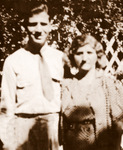 Milton & Bella
|
|
||
|
|||
|
©Roberta Tuller 2025
|
|||
